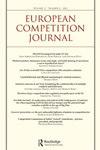Super-dominant and super-problematic? The degree of dominance in the Google Shopping judgement
Q2 Social Sciences
引用次数: 2
Abstract
ABSTRACT In the Google Shopping judgment, the General Court refers to Google’s super-dominance and with it its stronger obligation not to allow its behaviour to impair effective competition. The concept of super-dominance suggests that certain conduct could breach Article 102 TFEU only when adopted by super-dominant undertakings, but it remains uncertain how exactly it contributes to finding an abuse. The aim of this paper is to analyze the Google Shopping judgment in relation to the concept of super-dominance. We explore how the concept has evolved in the case-law and what role it has played when establishing an abuse of dominance and analyze whether reliance on super-dominance in the case law is consistent with the effects-based approach. Finally, we examine how Google Shopping fits with the evolution of super-dominance in the case law and the effects-based approach and what it means for the regulation of digital gatekeepers going forward.超级支配和超级问题?b谷歌购物判断的主导程度
摘要在对谷歌购物的判决中,普通法院提到了谷歌的超级统治地位,以及它不允许其行为损害有效竞争的更强有力的义务。超级支配地位的概念表明,某些行为只有在被超级支配地位企业采用时才可能违反《TFEU》第102条,但尚不确定它究竟如何有助于发现滥用行为。本文的目的是分析谷歌购物的判断与超级支配地位的概念。我们探讨了这一概念在判例法中是如何演变的,以及它在确立滥用支配地位时发挥了什么作用,并分析了判例法中对超级支配地位的依赖是否符合基于效果的方法。最后,我们研究了谷歌购物如何适应判例法和基于效果的方法中超级主导地位的演变,以及它对未来监管数字看门人意味着什么。
本文章由计算机程序翻译,如有差异,请以英文原文为准。
求助全文
约1分钟内获得全文
求助全文
来源期刊

European Competition Journal
Social Sciences-Law
CiteScore
1.50
自引率
0.00%
发文量
12
期刊介绍:
The European Competition Journal publishes outstanding scholarly articles relating to European competition law and economics. Its mission is to help foster learning and debate about how European competition law and policy can continue to develop in an economically rational way. Articles published in the Journal are subject to rigorous peer review by leading experts from around Europe. Topics include: -Vertical and Conglomerate Mergers -Enlargement of the Union - the ramifications for Competition Policy -Unilateral and Coordinated Effects in Merger Control -Modernisation of European Competition law -Cartels and Leniency.
 求助内容:
求助内容: 应助结果提醒方式:
应助结果提醒方式:


